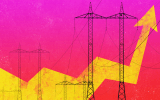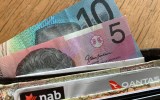


Reserve Bank boss Michele Bullock says “global developments” and continued doubt that inflation is under control were behind a surprise decision to leave rates untouched.
The RBA kept the official cash rate on hold on Tuesday, in a move that will disappoint borrowers hoping for further mortgage relief.
The surprise decision went against expectations of most traders and economists, who had expected a 25-basis -point cut to reflect under-control inflation and sluggish retail spending.
But in her post-meeting media briefing, Bullock said the board did not think that inflation “in a sustainable way” was as low as revealed in most recent data.
“Some components suggest that underlying inflation in the June quarter could be a little higher than our forecast … By our next meeting in five weeks, we will have the June quarter [data],” she said.
“The board decided to wait a few weeks to confirm that we’re still on track to meet our inflation and employment objectives … Global developments [also] took up a lot of time … over the past couple of days.”
June quarter CPI data is released on July 30.
Ahead of Tuesday’s announcements, money markets had forecast a 92 per cent chance of a rate cut. A further cut of 25 basis points would have shaved about $90 off the monthly payments on a $600,000 mortgage.
Instead, RBA board members voted 6-3 in favour of leaving the official cash rate untouched at 3.85 per cent. It is the first time the breakdown of a board vote has been revealed.
The decision means mortgage-holders will now have to wait at least until the central bank’s next meeting in August for further interest rate relief.
Treasurer Jim Chalmers acknowledged the decision was a surprise.
“This is not the outcome that millions of Australians were hoping for, or the outcome that economists or the market were expecting,” he said.
“I don’t second-guess decisions taken independently by the Reserve Bank. I think it’s a good thing the governor has the opportunity later on today to run the country through the board’s thinking.”
He said the “direction of travel on inflation and on interest rates has been established” after the RBA’s two earlier rate cuts this year.
“The Reserve Bank statement makes it clear that we’ve made substantial and sustained progress in the fight against inflation. And that’s why interest rates have already been cut twice in the last five months,” he said.
“It should be a source of considerable pride for Australians that, unlike a lot of countries, we’ve been able to make this progress on inflation without our economy going backwards and without sacrificing the gains that we’ve made in our labour market.”
Shadow treasurer Ted O’Brien, however, said Australian mortgage-holders were still paying hundreds more in additional interest payments since Labor came to government.
“Australian households are on their knees, industries are collapsing, businesses are falling over because Labor cannot manage the economy,” he said.
“We have seen around the world comparable jurisdictions bring down interest rates sooner than what we are seeing in Australia. Here in Australia, under the Albanese government, interest rates have been too high for too long.”
Marcel Thielant from Capital Economics said the central bank board’s post-meeting statement was “a touch more hawkish” than had been expected.
“The upshot is that, barring a major upside surprise in the June quarter inflation data, we still expect a cut at the bank’s next meeting in August,” he said.
“That said, the risks are now tilted towards less easing than the 100-basis-points of cuts we’re forecasting over the coming 12 months.”
Thielant said only six out of 37 economists polled by Refinitiv had expected a decision to pause on rates.
“The financial markets were nearly fully pricing in a 25-basis-point cut, too,” he said.
The RBA board next meets on August 11.










